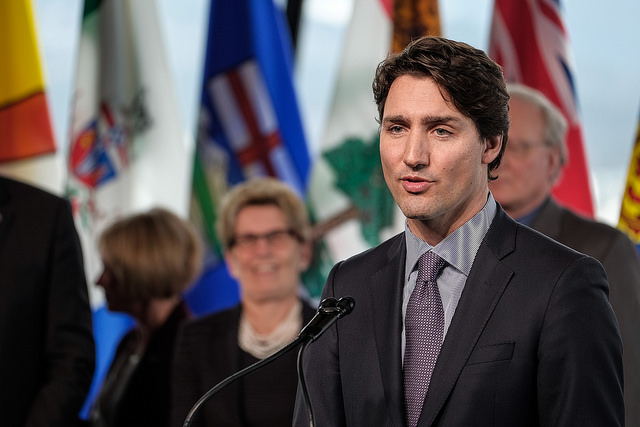Like this article? rabble is reader-supported journalism. Chip in to keep stories like these coming.
Will the Trudeau government back the TransCanada Energy East pipeline and Kinder Morgan Trans Mountain pipeline?
National Post columnist John Ivison writes:
“Justin Trudeau has told his senior lieutenants to draw up plans to make the Energy East pipeline and the Trans Mountain expansion in British Columbia a reality. The prime minister has been convinced by his finance minister, Bill Morneau, and other influential voices around the cabinet table that the pipelines have to be built to achieve the ambitious economic growth targets his government has set.”
There are reportedly strategies to win provincial government support in British Columbia and Quebec, as well as public support in general. Ivison argues that Trudeau could overcome British Columbia premier Christy Clark’s opposition to the Trans Mountain pipeline through various measures including negotiating more provincial revenue from the pipeline, and that he could get Quebec premier Philippe Couillard onside in exchange for a $1-billion federal investment in Bombardier.
Ivison adds, “The problem for the Liberals is that this conviction has to be conveyed subtly to a public that has decidedly mixed views on oilsands expansion and pipelines.” He notes the strategy may be to argue that the increase in tar sands production for these two pipelines would be offset by importing less oil from overseas (though that would be a challenge given these are primarily export pipelines), as well as “by cooling the rhetoric, resetting the regulatory process and privately courting moderate opponents.”
He highlights, “The prime minister has never been an advocate of a Canadian future without oil. He supported the Keystone XL pipeline, and explicitly stated that no country that found 170 billion barrels of oil would leave it in the ground.” That is true.
In January 2014, Trudeau stated, “I am … very interested in the Kinder Morgan pipeline, the Trans Mountain pipeline that is making its way through. I certainly hope that we’re going to be able to get that pipeline approved.” And in December 2014, Trudeau commented, “The [Energy East] project has still not attained the level of support it needs to go forward. I hope [TransCanada] will develop a means to reassure and demonstrate that this can be done in a responsible fashion.”
Earlier this year, in response to statements by Alberta premier Rachel Notley and Ontario premier Kathleen Wynne in supporting of getting oil to overseas markets, Trudeau commented: “I am very much in the camp of both premiers, Wynne and Notley, who demonstrated that Canada can and should work together on economic issues for all of us. …I’m feeling very good about our capacity to get our resources to market in a responsible and environmentally sustainable way.”
And just last month, Trudeau implied the wealth generated from pipelines could help fund the transition to a “low-carbon” economy. He said:
“We want the low-carbon economy that continues to provide good jobs and great opportunities for all Canadians. To get there, we need to make smart strategic investments in clean growth and new infrastructure, but we must also continue to generate wealth from our abundant natural resources to fund this transition to a low-carbon economy.”
It is also notable that just days after being sworn in as the Foreign Affairs minister, Stephane Dion stated, “We support [the Energy East project] but we want that to be done properly and it will be difficult to do if we don’t strengthen the process itself, the process of consultation with communities and the process of scientific environmental assessment.” Dion, who chairs the powerful Environment, Climate Change and Energy cabinet committee, has also commented, “We believe in development but it must be sustainable, including for the oil sands. It’s a challenge but we’ll do it with the industry, with the province of Alberta, we’ll do it altogether, we have no choice.”
The Council of Canadians argues that it is fundamentally impossible to both expand tar sands production with new export pipelines and meet our commitment for global warming not to exceed 1.5 degrees Celsius. We support the Leap Manifesto which calls for “no new infrastructure projects that lock us into increased extraction decades into the future,” “training and resources for workers in carbon-intensive jobs,” and a 100 per cent clean economy by 2050.
It is expected that the federal cabinet could decide on the Trans Mountain pipeline this December, and that the Energy East pipeline decision could be made in mid-2018.
Photo: Province of British Columbia/flickr
Like this article? rabble is reader-supported journalism. Chip in to keep stories like these coming.



